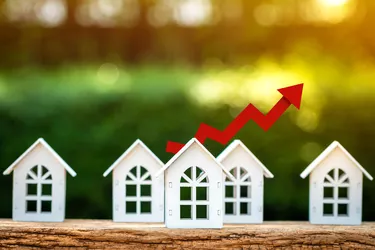
The hot housing market may have an unwanted effect on homeowners. Property tax increases may be in the future. States and municipalities are playing catch up from the previous year and are planning to increase property tax revenue. But will your property tax be affected?
Home Prices Increase
Video of the Day
One of the pandemic results was a pent-up need for new homes. The recent demand for single-family homes outstripped the supply. Last year saw double-digit percentage price increases as an answer to this demand, and home prices rose 16 percent. Since a home's valuation determines tax assessments, higher property taxes may be on the horizon.
Video of the Day
Consider also: Property Taxes When Closing on a House
Small Property Tax Increase Last Year
As of last year, property owners were still getting a break. Property taxes hadn't yet caught up to the home values. A single-family home only saw a 1.8 percent increase in property taxes. This resulted in the smallest tax pace in the last five years.
But with home prices continuing to rise, many taxpayers may find their property tax bills rising.
Property Tax Increases to Come
New homeowners, beware. Anticipated monthly home expenses could increase over the next few years. With property taxes based on fair market value, a high-valued home could cost you more down the road.
In post-COVID-19, municipalities are trying to economically recover from the pandemic by levying a higher property tax bill on taxpayers. For instance, in 2022, Chicago is handing homeowners a $38 increase. This is for homes valued at around $250,000 or more. This comes to a $76.5 million increase in property taxes.
Since a home's valuation determines tax assessments, higher property taxes may be on the horizon.
But in some instances, it could be years before homeowners see an increase in property taxes. For example, in New Jersey, some municipalities do reassessments yearly. Others may have the assessor break cities into districts and assess a separate district once every three years. And finally, other municipalities may wait five to seven years to reassess.
California’s Proposition-13 and New Homeowners
In the 1970s, California voters passed proposition-13. This capped and slowed down property tax rates. It mandated that property be assessed at market value at the time of sale. For future taxation, assessments could not go beyond 2 percent per year. This changed once the home sold again.
Because the taxes are based on the market value at the time of sale, if your neighbor purchased their new home after you, they would have a different tax rate than you. Basically, the longer you keep your home, the lower your property tax rates. Longevity saves money. But buying a new home doesn't.
Florida is similar. For example, if you have a primary residence in Florida, your taxes won't increase more than 3 percent per year. Your home's valuation doesn't matter. But if you buy a new home, that home's assessed value could be much higher. It's based on the sale price.
Homestead Exemptions
State and local governments exempt some real property from taxation. For example, most states have a homestead property tax exemption. It limits the maximum you must pay in property taxes. Although most states have homestead exemptions, New Jersey does not.
Why Tax Assessments?
With new home construction comes additional infrastructure, like sewer lines and utility lines. Additional schools must also be built to accommodate the increase in single-family homes.
Property tax revenue allows municipalities to fund infrastructure projects, schools, police and other emergency services.
- CNN: U.S. Home Prices are Rising So Fast, Property Taxes Can’t Keep Up
- Mansion Global: Which U.S. Cities Will Have Property Tax Increases in 2022
- Governing: How Will Property Taxes Fare in Surging Housing Market
- Barrons: Here’s What Could Change Your U.S. Property Tax Bill in 2022
- AARP: Property Taxes Rise in Hot Housing Market
- National Bureau of Economic Research: the Lock-in Effect of California’s Propositon-13
- Rocket Mortgage: Property Tax Exemptions: Seniors, Veterans and Others that Qualify
- Bloomberg: New York City’s Property Taxes are Crushing Homeowners